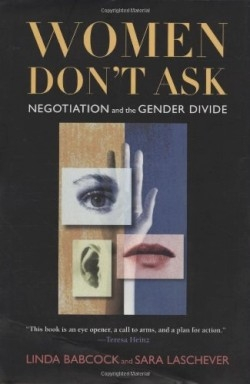Women Don't Ask
Negotiation and the Gender Divide
Women face inequality in the workplace and at home. Their salaries are lower, the value of their family-oriented work is often disregarded, and they are likely to have less in retirement than their male counterparts. These findings are not new-in fact they tend to be over-reported-but the authors bring to the fore a whole new explanation of the “why” behind these all-too-familiar trends.
Laschever’s writings have been published in The New York Times and The Boston Globe; she has taught writing at Boston University, and is senior writer and editor at Mercer Management Consulting in Lexington, Massachusetts. Babcock is the James Mellon Walton Professor of Economics at the H. John Heinz III School of Public Policy and Management at Carnegie Mellon University in Pittsburgh; she specializes in negotiation and dispute resolution consulting.
When Babcock was director of the Ph.D. program at Heinz, she asked an associate dean why so many male graduate students were teaching courses while their female counterparts were relegated to assistant status. The answer shook her to the core: “More men ask. The women just don’t ask.”
This revelation led the authors to look at women’s inability to ask for more and their avoidance of negotiation, both habits that are learned on the playgrounds and in the classrooms of youth. In one study cited, a group of girls engaged in competition were found to care little about winning and almost solely about maintaining equality and good feelings on their side, while the boys used conflict and their opponents’ weaknesses to succeed.
Women who strive to “become ladies first” (as the authors refer to it) put their own needs last, act vulnerable in the workplace, and avoid appearing aggressive or goal-oriented. Professionally and financially, these women are at a disadvantage from their first jobs on; their sheer gratitude at receiving an offer in the first place supercedes any drive to ask for more, setting them back an average of one million dollars over a lifetime.
Women Don’t Ask is not a straight recitation of findings-nor is it simply a “rant.” It goes beyond well-known facts and offers concrete tips on how women can remedy the underlying problems and actually move ahead. The authors prescribe refreshingly specific methods of negotiation that they’ve seen work for even the most confrontationally-challenged women.
Is the so-called gender divide so easily bridged? Is it really as easy as learning when and how to negotiate? These authors say that, yes, there is much to be gained from living by the “seek and ye shall receive” adage. So whether women are mothers, wives, blue-collar workers, business executives, or some combination of the above, they would benefit from just asking.
Reviewed by
Allison Nazarian
Disclosure: This article is not an endorsement, but a review. The publisher of this book provided free copies of the book to have their book reviewed by a professional reviewer. No fee was paid by the publisher for this review. Foreword Reviews only recommends books that we love. Foreword Magazine, Inc. is disclosing this in accordance with the Federal Trade Commission’s 16 CFR, Part 255.

